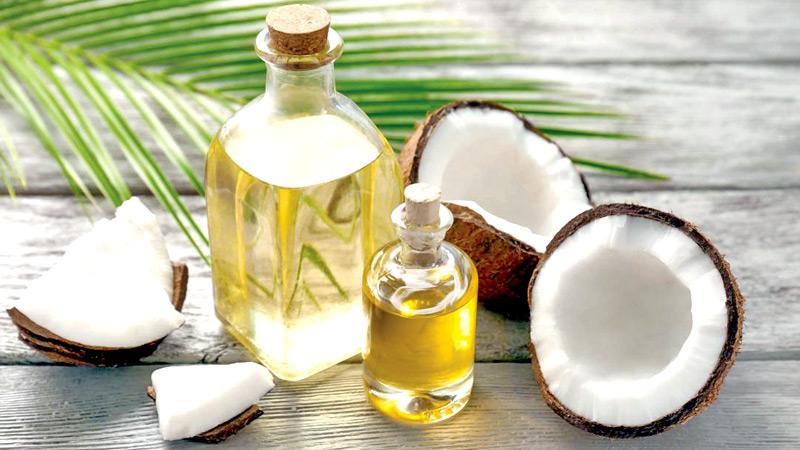
 There is a steep rise in the intake of oily and sugary foods during festive seasons. Most Sri Lankan traditional sweetmeats such as Kevum, Kokis, Narang Kevum, Asmie, Komala Watan, and Undu Wel are deep-fried. Dodol is made of rice flour and coconut milk which produces a considerable amount of oil during the preparation and the sweetmeat itself is extremely oily.
There is a steep rise in the intake of oily and sugary foods during festive seasons. Most Sri Lankan traditional sweetmeats such as Kevum, Kokis, Narang Kevum, Asmie, Komala Watan, and Undu Wel are deep-fried. Dodol is made of rice flour and coconut milk which produces a considerable amount of oil during the preparation and the sweetmeat itself is extremely oily.
Other than during festive seasons, Sri Lankans incorporate oil in their meals in different ways. It is also a tradition in Sri Lanka to prepare oily sweetmeats on special occasions. A tempered or a fried dish is included in at least one of the three meals of Sri Lankans. Coconut oil is widely used in frying, tempering, and deep-frying due to the abundance of coconut as well as the production of coconut oil in the country.
Apart from coconut oil, vegetable oil, and cooking oil have been popular in recent times. Some prefer using fat spread (margarine), butter, and ghee for cooking. Palm oil, made from the fruit of oil palm (Elaeisguineensis) is another popular fat used in cooking in Sri Lanka. Most margarine brands are made of palm oil. Olive oil is expensive but is used for cooking by those who can afford it and are health conscious. Recently, there were incidents of occurrence of Aflatoxins in cooking oils in Sri Lanka.
Commercial crop
Coconut (Cocos nucifera) is abundantly grown in Sri Lanka and is one of the major commercial crops. Sri Lanka is also one of the largest coconut exporters in the world. In the past, it was difficult to find a home garden without coconut trees due to the vast range of benefits of coconut.
The white colour edible coconut kernel (also called coconut meat) is used for extracting oil and milk to prepare various dishes. In the past, people manually extracted coconut oil at home for household consumption. This coconut oil is not contaminated with any kind of toxins or added chemicals in comparison to commercially produced or imported coconut oil in the store. Home-made virgin coconut oil has a distinct aroma and enhances the taste of cuisines.
Coconut milk is consumed regularly by Sri Lankans in the form of curry. Although coconut milk enhances flavour of a curry, when the latter is cooked for a long time, it releases oil. Hence, most cooked curries appear to be oily. Due to the addition of coconut milk to curries, the intake of coconut oil by Sri Lankans is comparatively higher than those who do not use coconut milk for cooking.
Since many a Sri Lankan traditional dish is prepared using either coconut oil or coconut meat (such as coconut milk and grated coconut), coconut can be regarded as an essential ingredient in Sri Lankan cuisine.
Since Sri Lankans incorporate coconut, especially oil and milk in their meals regularly, it is worth exploring the health impacts of the regular consumption of coconut.
Coconut oil is a popular ingredient in Paleo and keto diets as it is said to help shed body fat.
Moreover, some reports claim that coconut oil helps enhance immunity and metabolism while staving off dementia and Alzheimer’s disease.
Coconut oil has seen a surge in popularity in the world recently with the shift in people’s preference for plant-based food over animal-based ones. Plant-based coconut oil became a substitute for animal fat such as butter and ghee. Coconut oil is also regarded healthy in comparison to palm oil/ palm olein.
Easily digested
Coconut oil is high in medium-chain triglycerides (MCT). The oil contains medium-length chains of fats called triglycerides which are more easily digested and metabolised by the body. Due to this, MCTs are said to be healthier than longer-chain fatty acids as they hinder the storing of fat in the body.
Coconut oil also contains lauric acid which is said to increase both LDL as well as HDL cholesterol levels in the blood that promotes heart health. On the contrary, epidemiological studies have not shown that lauric acid helps prevent cardiovascular diseases.
Some epidemiological studies suggest that there is a low rate of cardiovascular diseases among the people living in countries such as India, Sri Lanka, and the Philippines who incorporate a comparatively high amount of coconut (in the form of oil and milk) in their traditional diets. It is unclear, however, whether the reporting of a low rate of cardiovascular diseases is due to the regular consumption of coconut oil or whether their overall healthy dietary habits and active lifestyle.
Nonetheless, Sri Lankans have been incorporating coconut oil in their diets for many decades. Coconut is consumed in the form of curry on daily basis and in comparison to other parts of the world, the number of heart patients reported in Sri Lanka is less. In comparison to homemade virgin coconut oil, store-bought coconut oil may not provide the associated health benefits.
Saturated fat
Although coconut oil is hailed as a superfood, concerns are raised if the health benefits of coconut oil are touted and hyped. Coconut oil is rich in saturated fat. Saturated fat is said to increase the risk of coronary heart disease. The question is whether an oil rich in saturated fat is healthy.
As per a report by Harvard Medical School, coconut oil consists of 80 to 90 percent of saturated fat. This gives the oil a firm texture in room and cold temperatures. Apart from coconut oil, palm oil, animal meat, Ghee, and dairy contain saturated fat too. Consumption of saturated fat has long been associated with the increase of harmful LDL (Low-Density Lipoprotein) cholesterol levels in the blood which increases the risk of cardiovascular diseases.
The American Heart Association (AHA) has issued a scientific advisory statement recommending the replacement of saturated fat with unsaturated fat. In one of the reports by AHA, the scientists discuss that coconut oil increases LDL cholesterol levels in the blood paving way for cardiovascular diseases. It explains that the consumption of unsaturated fat increases the HDL (High-Density Lipoprotein) levels in the blood.
LDL is regarded as ‘bad cholesterol’ and HDL the ‘good cholesterol’. The bottom line is that the consumption of saturated fat such as coconut oil increases the risk of cardiovascular diseases (such as heart diseases) while unsaturated fat lowers the risk of such diseases.
AHA also advises the intake of ‘not more than six percent of total calories from saturated fat, or about 13 grams based on a 2,000-calorie diet’ for those at risk of or who already have heart disease. “One tablespoon of coconut oil comes close to that limit, with about 12 grams of saturated fat,” AHA stated.
A group of independent researchers from Harvard Medical School has found that replacing saturated fat with unsaturated fat can reduce the risk of diabetes apart from heart diseases. The team led by Professor Walter C. Willet found that replacing saturated fat with junk foods, refined grains, and sugars may not contribute to heart health because the latter foods damage health. The team also suggests that while avoiding saturated fat (like coconut oil) incorporating more wholes grains, vegetables, and fruits in a diet is favourable to health.
It is no exaggeration that our predecessors in Sri Lanka lived healthy lives and their life expectancy was high. Non-communicable diseases (NCDs) were rare those days. Although coconut oil consumption became popular in recent decades in the country, ancient people widely used Mee oil in their cuisines. Mee tree (Illuppai Maram) or Mousey Mi which is scientifically known as Madhucalongifolia had been an important and valuable tree for Sri Lankans. The oil was extracted manually from the seeds. Prior to introducing coconut oil, Mee oil became their main source of plant-based fat used for frying and deep-frying.
Mee oil is plant-based unsaturated fat. Unsaturated fat remains in its liquid form even in cold temperatures. Unsaturated fats increase the HDL or good cholesterols levels in the blood and contribute to heart health. Olive oil, canola oil, sunflower oil, avocados, nuts, and seeds are other sources of unsaturated fat.
Plant-based unsaturated fats are also rich in Omega-3 fatty acids. As per research, omega-3 fatty acids help construct hormones that regulate blood clotting, contraction and relaxation of artery walls, and inflammation.
Researchers from the University of Washington found that adults whose Omega-3 fatty acid intake was high, recordeda lower mortality risk from heart diseases.
It would be a healthy option to revert to the use of Mee oil in cooking in place of coconut oil. Yet, large-scale production of Mee oil may not be a feasible task due to the lack of Mee trees in the country. Popularising Mee oil in cooking may yield beneficial results economically as well as health-wise.
Dr. Naveen De Soysa is the Assistant Secretary of the Government Medical Officers’ Association and the Registrar in Community Medicine at the National Institute of Health Sciences. Panchamee Hewavissenti is a culinary researcher and recipe creator
